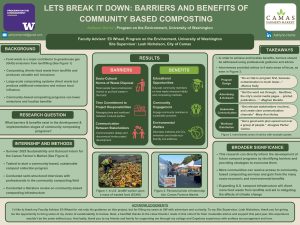Let’s Break it Down: Barriers & Benefits of Community Compost Programs
Diverting food waste from landfills is ranked as the third most effective solution out of 100 solutions for reducing Climate Change. Composting is one of the prevailing food waste diversion strategies, but very few communities across the U.S. have access to residential composting services. During my time as the City of Camas’ Farmer’s Market Sustainability and Outreach Intern, I worked to develop and implement a Community Composting Program (CCP) for the City of Camas. My personal research focused on identifying key barriers and benefits of developing and implementing CCPs in order to aid the creation of future CCPs by providing guidance and direction regarding program function and design. My data collection took place through interviews with a variety of individuals involved with the development and/or implementation of CCPs, as well as analyzing relevant literature and personal experiences developing a CCP. Using thematic analysis, interview responses were coded to identify key areas of difficulty and success regarding each interviewee’s experiences with CCPs. Findings show that cultural norms surrounding food waste, time commitment to project responsibilities, and communication between partner organizations and/or stakeholders are among the most common barriers to CCP infrastructure, while educational opportunities, environmental benefits, and community engagement were among the key benefits identified. These results help to expand available research on CCP infrastructure, which serves as guidance for more effective, efficient, and informed development processes for future CCPs. In turn, communities can receive accessible composting infrastructure that keeps related socio-economic and environmental benefits local.
